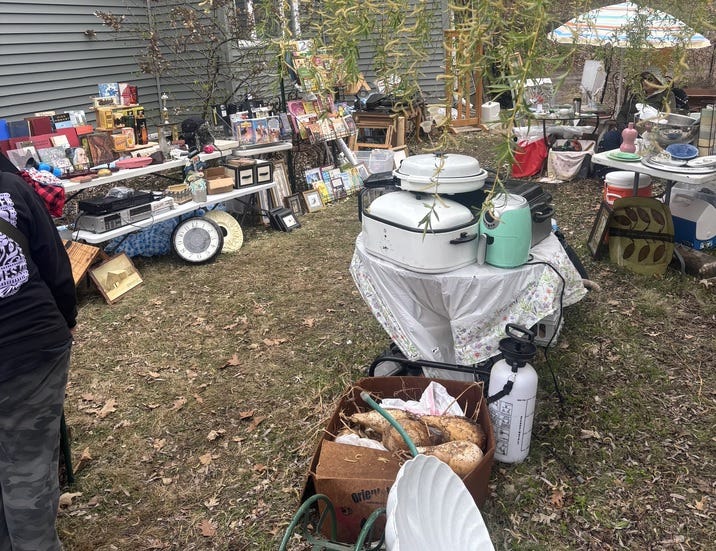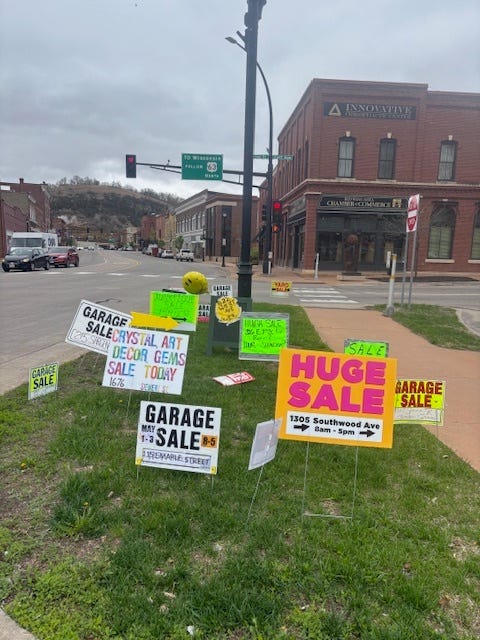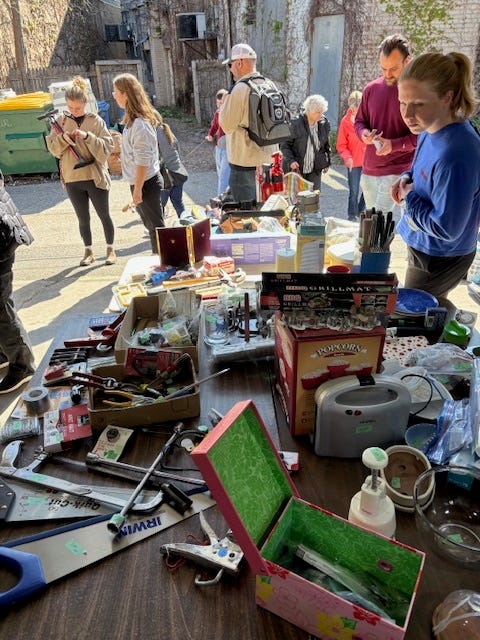
You've heard the saying: One man's junk is another man's treasure. Some call it stuff. Others call it junk. Whatever it is, many of us know that heavy, overwhelming feeling of having too much of it.
In this month's "A Closer Look" with Laura Oakes, she explores our tendency toward overconsumption, its environmental impact, and how businesses are making money off of it.
"Could have been a nicer day, huh?"
"Yeah. Tomorrow!"
"That's what I hear, like sunny and 70s."
Yes, the weather is a hot topic in a pole barn off a dirt road in Maiden Rock, Wisconsin. It's the first day of the annual 100 Mile Garage Sale along both sides of the Mississippi River border between Minnesota and Wisconsin, and shoppers are out in full force.
"I have a hodgepodge of different things, we're trying to pare down in our house and purge a little bit, and our deal here is make a pile, make an offer. That way people can just determine what they want to pay me and most of the time I just say yes" says Red Wing local artist Heidi Bacon.
She sits bundled in blankets under a small canopy propped in the side yard of her turn-of-the-century home, having made the clear decision to part with heirlooms and other things she knows her daughters are not interested in inheriting.
"Well, things are different in this generation of my children," Bacon explains. "They're not interested in collecting and, generational inheritance pieces. They don't have plans for those. Those are - sentimentally attached to those, but I'm working through cutting those ties a bit, so I can have a little bit less in my house. It's less cluttered, and also it gives other people an opportunity to have something that I like. And I'm happy to see it go to someone who loves it and wants it and chooses it."
Yes there are plenty of folks who truly love the collections they've amassed over the years, have room for them, and wouldn't dream of letting them go. But for others like Heidi, there comes a day for the cold, hard truth.
"I've got cords and pine cones and pieces of wood, and I've got all these projects that I'm going to do one day and I haven't," Bacon said. "And it's been decades. So it's time for it to go."
"How does that feel, to be saying goodbye to some of that stuff you've had in piles waiting to turn into projects or waiting to use, and now you're parting with it," asks Oakes?
"Well, it's bittersweet," she explains. "Some of the things that I've hand-painted for my children that they aren't interested in hanging on to, and the things I still want to do, the projects, I still want to do them. I just don't see me doing them. So it is, it's hard, but it's cathartic because it's simplifying my life and then I have less things to hang over my head. You haven't done this project yet, you know? This is just gathering dust in the basement. There isn't a purpose to these things and they're just making our house, you know, just busy."

Booming Times for Junk Removal
So what's behind all of this? Are we gluttonous Americans doing so well that we run out of room for all that we've purchased, either intentionally or mindlessly?
It may seem so, judging by the gleaming, five-story, glass-encased orange and white storage facilities dotting our cities and frontage roads these days.
It also aligns with the boom in junk removal companies, who we pay to take stuff off of our hands when it gets overwhelming or has run its course.
Sally Flinck is director of marketing and communications for Two Men and a Junk Truck who Laura met on a job site in Hopkins.
"I think a lot of the times, you know, people are busy," says Flinck. "And a lot of the times they don't realize how much stuff is collecting, especially if they have extra space in their home that they don't live in as in as much. Or an extra stall in their garage. Things quickly add up because they grab things, they may not need it at that time, and then they forget that they have it. And then they get another one. And then before they know it they have a whole garage full of tools that they have multiples of, or they also, a lot of people have passion projects that they work on and sometimes those things go halfway and things don't turn out the way they plan. Then it sits in the home."
Joe Davis is managing the haul-away.
"There's some kids' toys, there's some blinds, some extra carpet, just random miscellaneous things," Davis explains. "And we're going to load them in our truck, and then we bring them back to our shop and we try and pull anything we can reuse, pull anything we can recycle. After that, it goes to the landfill."
"And I suppose you're used to seeing kind of a potpourri of people's stuff, nothing ever really makes sense, it's just like mishmash," Oakes asks him.
"Sometimes it's larger furniture, sometimes it's piles of old dishes, sometimes we're doing full apartment cleanouts where it's big stuff, little stuff, it's everything," Davis tells her.
"Tell me a little bit about your thoughts just on, you're the guy on the frontlines, seeing people's junk day in and day out," says Oakes. "Are you ever amazed by just how much stuff we all seem to accumulate without even really knowing it half the time?"
"No," Davis quickly says. "It's really been an opportunity for business for us. People, it's easy to get stuff, get Amazon, it's easy to get it delivered. It's the ease of getting things, it's very obtainable and it's easy to collect it. I think people are, once your kids leave, you keep stuff in the basement, you go to downsize and it's there. And somebody's got to haul it away."
Landfills Continue To Pay Steep Price
Davis mentions the landfill. It’s almost become a naughty word in our lexicon, and maybe for good reason.
Kirk Koudelka is Assistant Commissioner of the Minnesota Pollution Control Agency.
"So, in Minnesota we're at a spot, because we have a 6.3 million-ton waste problem, that we are expanding landfills," says Koudelka. "So even just here in the metro for instance, we have three of them going through the permitting process right now and more will move that way. We have a number of them in greater Minnesota. A good example is the Superior Landfill that serves the northeast of Minnesota, is coming to its end of its life. It's filling up, so a new landfill has to be found for all of that waste."
At the same time, the MPCA is also trying to foster as much reusing and recycling as possible - and hopefully giving our regular household items a longer lifespan.
Koudelka says local fix-it clinics typically run by counties draw on handyman volunteers to help people keep things running, instead of simply throwing them away when something breaks.
"Great examples are vacuum cleaners," he explains. "When the switch maybe doesn't work, they can help. That vacuum cleaner, saves you hundreds of dollars to do it, and then that doesn't go into waste. They're also fun environments, some of them, they ring a bell every time something's fixed. They're weighing it actually goes in and out of the place so they can actually say this is how many pounds we keep out of a landfill. And you can use it for all kinds of things whether it's mending clothing, I've seen a little child have a stuffed animal that had a battery thing inside being fixed, I've had luggage fixed there."
Koudelka says all of that repairing and reusing can actually boost the state's economy.
"There are 1,300 reuse or repair businesses across the state, and that is 45,000 jobs from repairing everything from vehicles to electronics to donation centers where things are reused," Koudelka explains. "That's about a $3.1 to $4.7 billion annual revenue for those companies."

Younger Generations To The Rescue?
Another reason for optimism? Today’s young adults, who just may be our saving grace. They’re educated, motivated, and passionate about the environment. And they are working hard to undo some of the damage.
In fact, you might call 22-year old Gabriella Rossow a sustainability evangelist. She recently graduated from college and is a member of Greencorp, an offshoot of the Americorp Service Program dedicated to training environmental organizers.
Rossow is manning the dropoff table at Edina's annual community clothing swap.
"Textile waste, as we know, produces a lot of water waste and chemical waste, and it's really hard to recycle," Rossow told Oakes. "And I think people in Minnesota want to do better with their textile waste. So there's more events like this popping up where you can bring your clothes to swap with someone, so you're not creating all this waste and putting it in the landfill. You can also have the joy of shopping and bringing new clothes home."
"And that is joyful, I mean, this is fun and especially for young people like yourself, that's what you guys wear? This is it, this is the style now," Oakes asks. "So tell me about that a little bit?"
"Yeah, I personally love wearing vintage clothing and upcycling clothing," Rossow answers. "I sometimes make skirts out of bed sheets that I'd get at the thrift store, and that's kind of a trendy thing to do now. The 90s fashion is coming back with Gen Z I think - people like those mom jeans."
Mom jeans and all, Rossow is part of a wave of young adults hoping to turn the tide on cluttered and overabundant ways.
"Yeah, there is a real problem with overconsumption, and that is it's a real problem in my opinion with Gen Z too, especially with the online ordering companies like Shein, Temu, it's easier than ever to over-consume and just buy whatever you want whenever you want. And it is a real concern because what do you do with all that? If you're wearing last season's pants, and you don't want to wear them anymore, and you're not going to wear them again, where do they go? And it's a real concern how we deal with this overconsumption. And then the waste that comes after it because with the overconsumption you're buying new and you're buying new. What are you going to do with it after that, when you're done and bored of it."
I think the culture is starting to shift away from the overconsumption, not just because of the environment, but because it's expensive," Rossow continues. "And where do you put all that stuff?"
